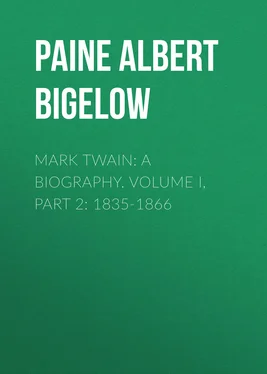Albert Paine - Mark Twain - A Biography. Volume I, Part 2 - 1835-1866
Здесь есть возможность читать онлайн «Albert Paine - Mark Twain - A Biography. Volume I, Part 2 - 1835-1866» — ознакомительный отрывок электронной книги совершенно бесплатно, а после прочтения отрывка купить полную версию. В некоторых случаях можно слушать аудио, скачать через торрент в формате fb2 и присутствует краткое содержание. Жанр: Биографии и Мемуары, foreign_antique, на английском языке. Описание произведения, (предисловие) а так же отзывы посетителей доступны на портале библиотеки ЛибКат.
- Название:Mark Twain: A Biography. Volume I, Part 2: 1835-1866
- Автор:
- Жанр:
- Год:неизвестен
- ISBN:нет данных
- Рейтинг книги:5 / 5. Голосов: 1
-
Избранное:Добавить в избранное
- Отзывы:
-
Ваша оценка:
- 100
- 1
- 2
- 3
- 4
- 5
Mark Twain: A Biography. Volume I, Part 2: 1835-1866: краткое содержание, описание и аннотация
Предлагаем к чтению аннотацию, описание, краткое содержание или предисловие (зависит от того, что написал сам автор книги «Mark Twain: A Biography. Volume I, Part 2: 1835-1866»). Если вы не нашли необходимую информацию о книге — напишите в комментариях, мы постараемся отыскать её.
Mark Twain: A Biography. Volume I, Part 2: 1835-1866 — читать онлайн ознакомительный отрывок
Ниже представлен текст книги, разбитый по страницам. Система сохранения места последней прочитанной страницы, позволяет с удобством читать онлайн бесплатно книгу «Mark Twain: A Biography. Volume I, Part 2: 1835-1866», без необходимости каждый раз заново искать на чём Вы остановились. Поставьте закладку, и сможете в любой момент перейти на страницу, на которой закончили чтение.
Интервал:
Закладка:
Another event of the voyage was crossing the Nicaragua Isthmus—the trip across the lake and down the San Juan River—a brand-new experience, between shores of splendid tropic tangle, gleaming with vivid life. The luxuriance got into his note-book.
Dark grottos, fairy festoons, tunnels, temples, columns, pillars, towers, pilasters, terraces, pyramids, mounds, domes, walls, in endless confusion of vine-work—no shape known to architecture unimitated—and all so webbed together that short distances within are only gained by glimpses. Monkeys here and there; birds warbling; gorgeous plumaged birds on the wing; Paradise itself, the imperial realm of beauty-nothing to wish for to make it perfect.
But it was beyond the isthmus that the voyage loomed into proportions somber and terrible. The vessel they took there, the San Francisco, sailed from Greytown January 1, 1867, the beginning of a memorable year in Mark Twain's life. Next day two cases of Asiatic cholera were reported in the steerage. There had been a rumor of it in Nicaragua, but no one expected it on the ship.
The nature of the disease was not hinted at until evening, when one of the men died. Soon after midnight, the other followed. A minister making the voyage home, Rev. J. G. Fackler, read the burial service. The gaiety of the passengers, who had become well acquainted during the Pacific voyage, was subdued. When the word "cholera" went among them, faces grew grave and frightened. On the morning of January 4th Reverend Fackler's services were again required. The dead man was put overboard within half an hour after he had ceased to breathe.
Gloom settled upon the ship. All steam was made to put into Key West. Then some of the machinery gave way and the ship lay rolling, helplessly becalmed in the fierce heat of the Gulf, while repairs were being made. The work was done at a disadvantage, and the parts did not hold. Time and again they were obliged to lie to, in the deadly tropic heat, listening to the hopeless hammering, wondering who would be the next to be sewed up hastily in a blanket and slipped over the ship's side. On the 5th seven new cases of illness were reported. One of the crew, a man called "Shape," was said to be dying. A few hours later he was dead. By this time the Reverend Fackler himself had been taken.
"So they are burying poor 'Shape' without benefit of clergy," says the note-book.
General consternation now began to prevail. Then it was learned that the ship's doctor had run out of medicines. The passengers became demoralized. They believed their vessel was to become a charnel ship. Strict sanitary orders were issued, and a hospital was improvised.
Verily the ship is becoming a floating hospital herself—not an hour passes but brings its fresh sensation, its new disaster, its melancholy tidings. When I think of poor "Shape" and the preacher, both so well when I saw them yesterday evening, I realize that I myself may be dead to-morrow.
Since the last two hours all laughter, all levity, has ceased on the ship—a settled gloom is upon the faces of the passengers.
By noon it was evident that the minister could not survive. He died at two o'clock next morning; the fifth victim in less than five days. The machinery continued to break and the vessel to drag. The ship's doctor confessed to Clemens that he was helpless. There were eight patients in the hospital.
But on January 6th they managed to make Key West, and for some reason were not quarantined. Twenty-one passengers immediately deserted the ship and were heard of no more.
"I am glad they are gone. D—n them," says the notebook. Apparently he had never considered leaving, and a number of others remained. The doctor restocked his medicine-locker, and the next day they put to sea again. Certainly they were a daring lot of voyagers. On the 8th another of the patients died. Then the cooler weather seemed to check the contagion, and it was not until the night of the 11th, when the New York harbor lights were in view, that the final death occurred. There were no new cases by this time, and the other patients were convalescent. A certificate was made out that the last man had died of "dropsy." There would seem to have been no serious difficulty in docking the vessel and landing the passengers. The matter would probably be handled differently to-day.
LVII
OLD FRIENDS AND NEW PLANS
It had been more than thirteen years since his first arrival in New York.
Then he had been a youth, green, untraveled, eager to get away from home.
Now a veteran, he was as eager to return.
He stopped only long enough in New York to see Charles Henry Webb, late of California, who had put together a number of the Mark Twain sketches, including "The Jumping Frog," for book publication. Clemens himself decided to take the book to Carleton, thinking that, having missed the fame of the "Frog" once, he might welcome a chance to stand sponsor for it now. But Carleton was wary; the "Frog" had won favor, and even fame, in its fugitive, vagrant way, but a book was another matter. Books were undertaken very seriously and with plenty of consideration in those days. Twenty-one years later, in Switzerland, Carleton said to Mark Twain:
"My chief claim to immortality is the distinction of having declined your first book."
Clemens was ready enough to give up the book when Carleton declined it, but Webb said he would publish it himself, and he set about it forthwith. The author waited no longer now, but started for St. Louis, and was soon with his mother and sister, whom he had not seen since that eventful first year of the war. They thought he looked old, which was true enough, but they found him unchanged in his manner: buoyant, full of banter and gravely quaint remarks—he was always the same. Jane Clemens had grown older, too. She was nearly sixty-four, but as keen and vigorous as ever-proud (even if somewhat critical) of this handsome, brilliant man of new name and fame who had been her mischievous, wayward boy. She petted him, joked with him, scolded him, and inquired searchingly into his morals and habits. In turn he petted, comforted, and teased her. She decided that he was the same Sam, and always would be—a true prophecy.
He went up to Hannibal to see old friends. Many were married; some had moved away; some were dead—the old story. He delivered his lecture there, and was the center of interest and admiration—his welcome might have satisfied even Tom Sawyer. From Hannibal he journeyed to Keokuk, where he lectured again to a crowd of old friends and new, then returned to St. Louis for a more extended visit.
It was while he was in St. Louis that he first saw the announcement of the Quaker City Holy Land Excursion, and was promptly fascinated by what was then a brand-new idea in ocean travel—a splendid picnic—a choice and refined party that would sail away for a long summer's journeying to the most romantic of all lands and seas, the shores of the Mediterranean. No such argosy had ever set out before in pursuit of the golden fleece of happiness.
His projected trip around the world lost its charm in the light of this idyllic dream. Henry Ward Beecher was advertised as one of the party; General Sherman as another; also ministers, high-class journalists—the best minds of the nation. Anson Burlingame had told him to associate with persons of refinement and intellect. He lost no time in writing to the Alta, proposing that they send him in this select company.
Noah Brooks, who was then on the Alta, states—[In an article published in the Century Magazine.]—that the management was staggered by the proposition, but that Col. John McComb insisted that the investment in Mark Twain would be sound. A letter was accordingly sent, stating that a check for his passage would be forwarded in due season, and that meantime he could contribute letters from New York City. The rate for all letters was to be twenty dollars each. The arrangement was a godsend, in the fullest sense of the word, to Mark Twain.
Читать дальшеИнтервал:
Закладка:
Похожие книги на «Mark Twain: A Biography. Volume I, Part 2: 1835-1866»
Представляем Вашему вниманию похожие книги на «Mark Twain: A Biography. Volume I, Part 2: 1835-1866» списком для выбора. Мы отобрали схожую по названию и смыслу литературу в надежде предоставить читателям больше вариантов отыскать новые, интересные, ещё непрочитанные произведения.
Обсуждение, отзывы о книге «Mark Twain: A Biography. Volume I, Part 2: 1835-1866» и просто собственные мнения читателей. Оставьте ваши комментарии, напишите, что Вы думаете о произведении, его смысле или главных героях. Укажите что конкретно понравилось, а что нет, и почему Вы так считаете.












